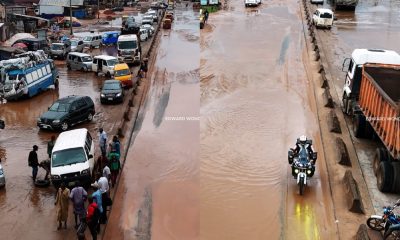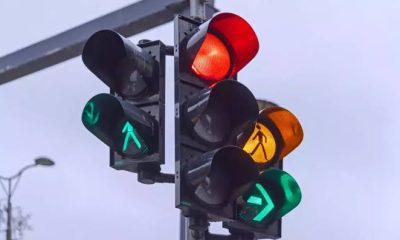Travel Tips
How to plan for a safe journey

In this article, Roadking.ng will give you a comprehensive guide to planning for a safe Journey, from start to finish.
Planning a journey is a multifaceted process that involves careful consideration of various factors to ensure a smooth and enjoyable travel experience.
Whether embarking on a road trip, flying to a distant destination, or taking a train journey, thoughtful planning is key.
Let’s now delve into the essential steps to plan a journey effectively;
1. Define the Purpose and Destination
- Begin by clearly defining the purpose of your journey. Whether it’s for leisure, business, or any other reason, having a clear goal will guide your planning.
- Choose a specific destination and gather information about it, including local attractions, weather conditions, and cultural nuances.
2. Establish a Budget
- Determine the financial aspect of your journey by establishing a budget. Include transportation, accommodation, meals, activities, and miscellaneous expenses.
- Be realistic and factor in unexpected costs to avoid financial stress during your trip.
3. Select Travel Dates
- Choose the dates for your journey, considering factors such as weather, peak seasons, and personal commitments.
- Be flexible with your dates if possible, as it can sometimes lead to cost savings on transportation and accommodation.
4. Book Transportation
- Based on your destination, decide on the mode of transportation – whether it’s by car, plane, train, or a combination.
- Book tickets well in advance to secure the best prices, and consider travel insurance for added protection.
5. Accommodation Reservations
- Research and choose suitable accommodation options based on your preferences and budget.
- Make reservations early to ensure availability, especially during peak travel seasons.
6. Create a Travel Itinerary
- Plan a rough itinerary outlining daily activities, sightseeing, and downtime.
- Be realistic about the time needed for each activity and allow for flexibility in case plans need adjustment.
7. Pack Thoughtfully
- Create a packing list to ensure you have all necessary items for your journey.
- Check the weather forecast for your destination and pack accordingly, including any specific clothing or accessories.
8. Ensure Necessary Documentation
- Check and organize all required travel documents, such as passports, visas, driver’s license, and any reservations or confirmations.
- Consider making copies or digital backups of important documents.
9. Health Preparations
- If traveling internationally, research health recommendations and vaccinations for your destination.
- Pack a basic first aid kit and any necessary medications.
10. Inform Others and Secure Your Home
- Inform friends or family about your travel plans and share your itinerary.
- Secure your home by locking doors and windows, setting alarms if needed, and asking a trusted neighbor to collect mail.
11. Stay Informed
- Stay updated on any travel advisories, weather conditions, or changes in your destination.
- Utilize travel apps for real-time information and assistance during your journey.
Planning a journey requires careful consideration of various elements to ensure a seamless and enjoyable experience.
By following these steps and staying organized, you can create a well-thought-out itinerary that caters to your needs and preferences.
Remember that flexibility is key, allowing you to adapt to unexpected situations and make the most of your travel adventure.

News Update
The Most Dangerous States in Nigeria to Travel to Right Now

If you’re planning travel within Nigeria, up-to-date knowledge of regional security risks is essential.
Also Read: Nigeria’s Most Dangerous Routes: Death Traps and Insecurity Hotspots
Multiple international advisories, including from the U.S., New Zealand, the U.K., and Canada, highlight a growing number of states to avoid due to violence, kidnapping, terrorism, and general instability.
18 States Rated “Do Not Travel”

Governments worldwide have flagged 18 states across Nigeria as high-risk zones, warning travelers to avoid them completely:
- Borno & Yobe: Ongoing terrorism and Boko Haram activity
- Northern Adamawa, Kogi, Bauchi, Gombe, Kaduna, Kano, Katsina, Sokoto, Zamfara: High kidnapping and banditry risk
- Abia, Anambra, Bayelsa, Delta, Enugu, Imo, Rivers (except Port Harcourt): Elevated crime, armed robbery, and gang violence
New Zealand’s advisory goes even further, Abuja (outside central area) and nearly all states outside Lagos and Calabar are included in its “Do Not Travel” list due to terrorism and kidnapping threats.
What Makes These States Especially Dangerous
Northeast & Northwest: Insurgent Terror & Banditry
- States like Borno, Yobe, and northern Adamawa remain frontline regions for Boko Haram and ISWAP insurgencies. Persistent attacks, abductions, and bombings continue to destabilize travel corridors.
- In the northwest, Katsina, Kaduna, and Zamfara face intense bandit-led kidnappings and rural raids. Recent operations freed dozens of hostages, often after armed confrontations.
Middle Belt: Ethno-Religious Clashes & Farmer-Herder Violence
- States like Plateau and Benue are plagued by escalating violence between herders and farmers compounded by climate stress and resource competition.
Southern States: Crime, Armed Gangs & Kidnappings
In parts of the South, Rivers, Delta, Bayelsa, kidnapping, port-related insecurity, and gang violence remain serious concerns even in urban zones. Rivers State, in particular, ranks among the most violent in the south.
Capital Area & Other Regions: Spillover Risks
Travel advisories also include the outer suburbs of Abuja, where violent crime including armed robbery and carjackings has spread beyond central areas.
RoadKing.ng Safety Snapshot
Region / Risk Type – Key States Security – Threats
Northeast – Borno, Yobe, Adamawa (North) – Terrorism, bombings, insurgent attacks
Northwest & North-Central – Katsina, Kaduna, Kogi, Zamfara, Plateau, Benue – Kidnappings, bandit raids, communal violence
South (Zones of Access) – Rivers, Delta, Bayelsa, Imo, Enugu etc. – Armed gangs, organized crime, kidnappings
Federal Capital Area – Abuja suburbs – Carjacking, violent robbery
What RoadKing.ng Recommends
- Avoid travel to the listed high-risk states unless absolutely necessary.
- If travel is unavoidable, limit yourself to central urban areas (e.g., Lagos, Port Harcourt, central Abuja).
- Travel during daylight hours only.
- Use registered transport providers or hotel-arranged transfers.
- Stay informed, monitor local news, embassy advisories, and maintain communication with trusted locals.
Final Thought
The security situation in Nigeria remains fluid. Until significant improvements in safety infrastructure and governance occur, even urban hubs carry risk. When planning travel, always exercise extra caution and prioritize safety.
Travel Tips
Lokoja-Abuja Road: Why Accidents Are Constant Here

The Lokoja-Abuja Expressway, a critical link between Nigeria’s northern and southern regions, has become a nightmare for motorists.
Also Read: Family of 4 Perish on Abuja-Lokoja Highway
Despite being one of the busiest roads in the country, it remains riddled with deep potholes, inadequate signage, and dangerous curves that contribute to a growing list of fatal accidents.
Over the past six months, this 165-kilometer stretch has witnessed more than 120 recorded crashes, according to FRSC data. Many drivers now refer to it as “The Corridor of Death.”
Why the Road is So Dangerous
1. Poor Maintenance
Years of neglect have left large sections of the road in a state of disrepair. Potholes, some deep enough to damage a vehicle’s suspension in one hit, force drivers into sudden lane changes, often leading to head-on collisions.
2. Traffic Volume
The road serves as the main entry into the Federal Capital Territory (FCT) from the south, making it heavily trafficked by trucks, buses, and private vehicles. Peak hours can see traffic stretching for over 5 kilometers at bottlenecks.
3. Driver Behavior
Impatience is rampant. Commercial drivers, under pressure to meet time targets, frequently engage in dangerous overtaking, particularly on blind bends near Abaji and Gegu villages.
4. Weather Hazards
During the rainy season, poor drainage causes sections of the road to flood, creating hydroplaning risks and further obscuring already faded road markings.
Hotspots for Accidents
FRSC reports identify these locations as the most dangerous:
- Gegu Junction – notorious for truck collisions
- Abaji Hills Bend – poor visibility and sharp curves
- Zuba–Lokoja stretch – heavy commuter congestion and roadside markets
Voices from the Road
- Ahmed Bello, a long-distance bus driver: “Every trip is a gamble. You either lose time avoiding potholes or risk your life overtaking slow trucks.”
- Ngozi Okeke, a trader: “We’ve seen too many bodies on this road. Government must act before more lives are lost.”
Government Response
The Federal Ministry of Works announced in April 2025 that a ₦45 billion rehabilitation project had been approved. However, only patchwork repairs have been carried out so far, leading to skepticism among road users.
An official from the ministry, speaking under anonymity, admitted that funding disbursement delays have stalled progress.
Safety Recommendations for Drivers
- Avoid nighttime travel when visibility is low and streetlights are absent.
- Keep a longer following distance, especially behind heavy-duty trucks.
- Plan extra travel time to avoid rushing on dangerous stretches.
- Use alternate routes where possible during heavy rain.
Expert Opinion
Transportation analyst Engr. Salisu Umar warns that fixing the road alone will not end the fatalities:
“We need stricter driver licensing, mandatory speed governors for commercial buses, and designated truck lay-bys. A good road without disciplined drivers will still kill.”
Conclusion
The Lokoja-Abuja Road is more than just an infrastructure project waiting for completion, it is a daily battle for survival for thousands of Nigerians. Until the combination of road repairs, strict law enforcement, and driver education comes together, the tragedies will continue.
References:
- Federal Road Safety Corps – Mid-Year Crash Statistics, January–June 2025
- Federal Ministry of Works – Road Rehabilitation Budget Report (April 2025)
- RoadKing.ng archives – Lokoja–Abuja safety feature (2024)
Travel Tips
Why a Rainy Season Road Safety Campaign Is Urgently Needed in Nigeria

Every rainy season, Nigerian roads become deadlier.
Potholes fill with water, visibility drops, and hydroplaning becomes common. Despite this, most drivers continue as though conditions haven’t changed.
Also Read: How to Drive in Heavy Rain: Safety Tips
According to FRSC 2025 data, wet-weather crashes account for nearly 21% of road fatalities during the rain season.
Why Rainy Season Driving Is So Dangerous in Nigeria
Poor Drainage Systems
- Flooded sections hide deep potholes and loose manhole covers.
- Key blackspots include Ijora Causeway (Lagos), Lokoja–Makurdi Road, and Onitsha–Owerri Highway.
Low Vehicle Maintenance
- Worn tyres and faulty brakes perform poorly in wet conditions.
- Many drivers ignore wiper replacement, worsening visibility.
Poor Road Visibility
- Heavy rainfall + inadequate lighting make it difficult to spot hazards.
What a National Campaign Should Focus On
| Key Risk | Safety Recommendation |
|---|---|
| Hydroplaning | Drive 20% slower, avoid sudden braking |
| Flooded potholes | Avoid high-speed puddle crossing, maintain safe distance |
| Tyre blowouts | Ensure minimum 1.6mm tread depth |
| Poor visibility | Replace wipers yearly, keep headlights clean |
| Brake failure in wet | Service brakes before rainy season |
How Other Countries Handle Rain Safety
- India: Monsoon safety PSAs on TV, radio, and social media every season.
- Thailand: Mandatory pre-rainy season tyre and brake inspections for commercial buses.
- Kenya: Flood-prone roads are temporarily closed and diversions announced on national radio.
RoadKing.ng Call to Action
Nigeria urgently needs:
- A Raining Season Driving Campaign driven by FRSC & state traffic agencies.
- Regular public advisories through radio, social media, and community outreach.
- Seasonal vehicle inspection programs before the rains begin.
Rain shouldn’t automatically mean danger, but without education and preparation, Nigeria’s rainy season will continue to claim lives unnecessarily.

 Driver Training1 day ago
Driver Training1 day agoTop 10 Driving Mistakes Motorists Make

 Car/Vehicle Maintenance1 day ago
Car/Vehicle Maintenance1 day ago5 Reasons Why Your Steering Wheel Might Vibrate at Highway Speeds

 Skillful driving15 hours ago
Skillful driving15 hours agoWhy Drivers Keep Ignoring Traffic Lights

 Crash News2 days ago
Crash News2 days agoBMW 328i 3 Series 2014–Sleek, Powerful & Ready for sale

 Driver Training14 hours ago
Driver Training14 hours agoDeadly Distraction: Dangers of Phone Use While Driving

 International Crash Report13 hours ago
International Crash Report13 hours agoGas Truck Explosion Kills Four, Injures 90 in Mexico












